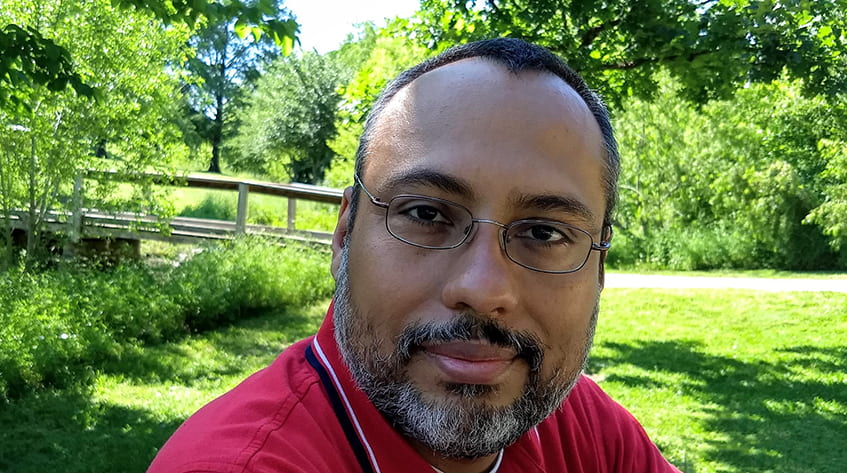 Rice University alumnus Santiago Mejia (B.A. ’91) began his computer science journey the hard way – without a computer.
Rice University alumnus Santiago Mejia (B.A. ’91) began his computer science journey the hard way – without a computer.
“I read a lot of Asimov’s Foundation series in high school and became interested in computing. The local library had one book on Basic and I worked through all the programs on paper because I was fascinated by expressing thoughts like a mathematical proof in a way that would actually do something,” he said.
That library was in East Bernard, Texas, an agricultural community with a population of about 1500. When the local high school obtained a computer for their library, Santiago asked for permission to stay after school and use it.
“My patient mother picked me up after school every day for a year as I got familiar with the computer. Later, I was accepted by some tech schools on the coasts, but I decided I wasn’t mature enough to live that far from home. In fact, I went home quite a few weekends my freshman and sophomore years at Rice until I finally felt ready to live ‘full-time’ on campus,” said Mejia.
His introductory programming course was taught by Michael Pearlman using Pascal, and it revealed a very different environment than his previous library computer years.
He said, “I’d come from the Wild West GoTo’s of Basic, and came to love the rigor of Pascal. To this day, when I write code, it’s Pascal’s beautiful clarity that I aim for. And I still comment; sometimes I’ll even leave haikus.”
He was also influenced by a senior level course taught by Tony Gorry. The artificial intelligence seminar introduced Mejia to concepts he found fascinating even though AI was at the time limited to small amounts of data and small networks.
While working through his COMP courses, he applied for a student job supporting the university’s computers. Jerry Boettcher, another Rice student from East Bernard, introduced Mejia to his boss, who then hired Mejia. His first task was working with graduate students.
“In those days, the grad students all had dumb terminals that connected to a wiring closet, so I learned about soldering and modems and null modems. I wound up doing backups and learning about the back-ends of many of our systems, and was stringing thick Ethernet cables down the Computer Science hallways in Herman Brown.
“But it was walking into the Mudd building and seeing all the servers that really drew me in. This was pre-web and there were gatekeepers of the knowledge. There were huge racks of Solaris manuals, but only certain people had access to them. We had to make friends with those people to get in the know. It was almost a priest-like culture –was I ‘geek’ enough to be initiated? It was incredibly fun.”
For the last decade, Mejia has supported applications, projects, and programs for the Department of Veterans Affairs. His current projects involve requests for Veteran medical and VA personnel information housed in multiple databases.
“Sometimes the information request is going to be published as public data, sometimes it is going to another Federal agency, sometimes it is for our lawyers to use in a case. There are different regulations depending on the circumstances, and I confess I had become more interested in getting the technical parts right than thinking about the larger ethical landscape.
“So I was really affected by Professor Luay Nakhleh’s talk at February event for Rice CS alumni. He made the point that CS employees are probably among the top 10% of earners in the United States, and with privilege comes responsibility. We can’t just go out there and do our tech thing without consequences.”
Mejia was referring to a story about facial recognition algorithms applied –without consent– to individual photos stored in online databases. He said Nakhleh’s talk made him rethink his own role in data privacy protection.
“Professor Nakhleh disabused us of the notion that we don’t have a part to play and it was good for me to hear that. Even though data privacy concerns are officially under the jurisdiction of our legal staff, I can ensure that all the VA data leaving my computer is properly limited in scope and adhering to the applicable legal frameworks.”
He also realizes protecting data requires collaboration across all levels. Lawyers are often not as familiar with the data as the technical people, but technical people may be unfamiliar with new or revised legal requirements, and employees in the middle may not realize the data they request contains PII (personally identifiable information).
Mejia said, “I can read the relevant statues and I’ll leave the interpretation up to the lawyers, but if it sounds like the request I’ve been given goes against the intent of the statues, I’ll kick it back to the requestor and ask them to reconsider. We are all responsible for this, even if we are not the ones making the legal decisions in the end.”
Like data privacy regulations, Mejia’s computing interests and roles have shifted over time. But each transition was supported by his Rice CS experience. His career path has also partnered Mejia with co-workers from other educational programs and he realized the strength of Rice’s CS education does not lie in technical knowledge.
“Some of the boot camp graduates may know more about a particular framework than a Rice CS grad, but the Rice CS grad will adapt more quickly to the next framework, and the next,” he said.
“Less competitive schools are teaching CS students the practice – and we need lots of those people. But we also need people who understand the theory and can build the new platforms – and that theory is what Rice teaches.
“If you want to build familiar patterns with LEGOs, go somewhere else. If you want to make the LEGOs — or at least do something funky with them– come to Rice.”